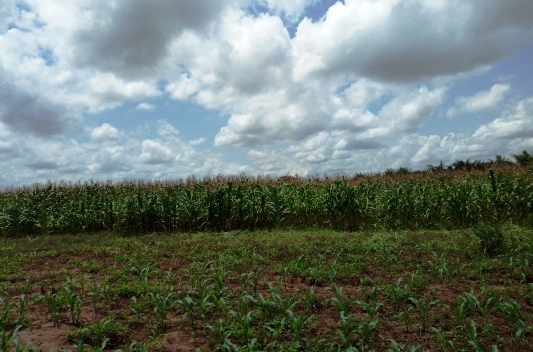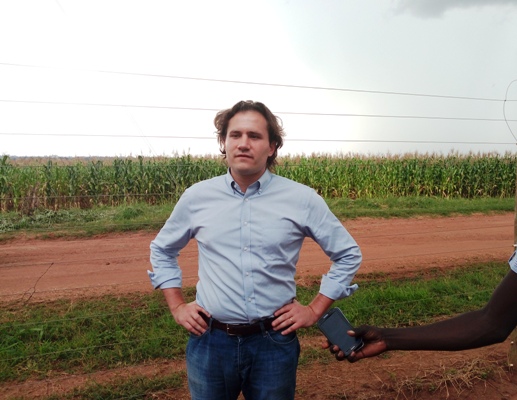Agilis Partners is Uganda’s largest maize and oilseed farming company and a leading exporter of grains from Uganda to the East African region.
Agilis Partners Uganda, an initiative of American investors is made up of Asili Farms and the Joseph Initiative Ltd.
The Group does its farming activities in Masindi and Kiryandongo districts (Kiryandongo was curved out of Masindi district a few years ago), that are located approximately 217 kilometres (by road), North-West of Kampala, Uganda’s capital city.
Asili Farms is engaged in large scale commercial maize, soya bean and sunflower farming in the country.
Currently, the company has over 3,000 hectares of maize at various stages.
Business Focus caught up Benjamin Prinz (in featured photo), the Managing Director of Asili Farms and a co-founder of Agilis Partners Uganda about their operations.
Below are the excerpts of the interview;
Qn: Briefly tell me about Agilis Partners Uganda?
A: Agilis Partners was founded in 2013. We started business by creating a more efficient way to source grain from small scale farmers and supply that grain to buyers in the region. We invested heavily in post-harvest infrastructure such as storage silos and grain handling equipment.
We found that the local production was not big enough to meet the enormous demand. Therefore, we also started investing in our own primary production in 2014. By having a large source of our own production from our own nucleus farms, we are able to ensure that the grain we buy from smallholders and that we market in the region is competitive. Asili Farms is sitting on 13,500 acres in Western Uganda.
Qn: What was the motivation behind joining the agricultural sector that is deemed risky in terms of returns?
A: We joined the agricultural sector after helping an orphanage build a pig farm. The pigs were eating so much maize, and we could not get reliable quality at low prices. For us, it was a major opportunity to impact lives because of the massive involvement in the sector.
We also saw a huge market; we thought if East Africa does not produce its own food, it will be dependent on outside countries to produce its food. By importing food, East Africa is exporting jobs to other countries.
Our vision is to empower Ugandans to feed East Africa and Africa at large because we believe Uganda has potential; we have the human potential, the agronomic potential and the capital here to feed East Africa and Africa at large.
Qn: Where are the opportunities in the sector and how are you helping farmers that you work with harness these openings?
A: The major opportunities are; increased climate change resilience through crop rotation, improved yields through improved farming practices including plant population, hybrid seed usage and weed control and healthier soils for the long-term through crop rotation and conservation farming.
We help farmers through buying their produce, thus providing ready market. We also develop the know-how and best practices on our own farms and train farmers by using our farms as demonstration sites.
Qn: What is the Agilis’ agricultural Investment model and how does this model help Uganda’s agricultural sector in terms of commercialization of the sector?
A: We are helping the industry commercialize through market access enabled through our ability to sell produce. Our improved agriculture practices are also being replicated by other farmers.
We are also improving the skill sets of Ugandans to work in the agriculture sector as machine operators, mechanics and others.
Qn: How does your investment model weave into the neighboring communities that are also into the farming?
It is important to note that while the majority of Ugandans are involved in agriculture sector, less than 5% are in wage paying jobs. This means that the majority of people involved in agriculture are subsistence farmers. Agilis is revolutionizing employment opportunities in Uganda by making agricultural work appealing. We employ the local community; we have 675 employees, with a substantial number being female.
In 2018, Joseph Initiative, in partnership with Asili Farms, we trained over 3,500 farmers and sourced grain from a network of 15,000 farmers. In 2018, Joseph Initiative wholesaled enough food to feed 550,000 people in East Africa.
We have good storage practices which not only help to reduce aflatoxin, a food borne carcinogen found in grains in tropical climates, but also reduces post-harvest losses.
The Joseph Initiative’s customers are regional food manufacturers, animal feed manufacturers.
Qn: Many investors mention land as a major challenge facing agriculture development in Africa. Has it posed a challenge to Agilis?
A: Getting access to land has not been a major challenge for Agilis. All of the land Agilis manages has been acquired from private individuals. Each of these properties have been titled by private individuals, and Agilis has never required access to customary / community land. Agilis has never been granted land by Government, and we have not attempted to acquire land from Government.

In every land acquisition, Agilis has consulted the local community on numerous occasions prior to purchase and during the handover process. These meetings are attended by local government officials and community leaders. In addition, Agilis has never evicted occupants of land, even if the occupants do not have a legal right to the land and such eviction would be in Agilis’s rights. Agilis reaches negotiated settlements with occupants of land, using government guidance on such compensation.
Agilis works with legal counsel, local leaders and communities to ensure that its investments maximize the benefit for the local community through employment.
When Agilis enters into a community, the community now has a vibrant buyer of maize and employer, not to mention the millions of shillings employees spend within those communities to grow the local economy. The country also benefits from Agilis’s investments in land—Agilis takes land that was previously idle and highly unproductive and transforms the farms into productive food security centers that reduce the cost of food for urban dwellers.
Qn: This is a huge farm worth billions of shillings. How much have you invested in the project so far?
A: We have invested a very significant amount of capital. We are actually the largest American agricultural investor in Uganda. We are one of the biggest customers of John Deere, which is one of the big American companies in Uganda.
We have invested significantly in land as well.
Qn: What challenges are you facing?
A: Weather is a key challenge; weather is constantly changing and rain patterns have changed in the past and are possibly changing. We have deployed crop rotation as a very key piece of environmental strategy; it helps us be resilient to climate change. By rotating the crops that you use, you are able to diversify your exposure and your dependence on weather patterns.
Maize prices also keeps fluctuating because the region lacks solid infrastructure, local production levels are not high enough for stable prices. So we need to be investing locally to achieve higher levels of production.
Qn: How would you describe Uganda’s agricultural potential?
Infinite (he laughs)…
Qn: In the long term, what plans do you have for the sector?
A: We envision a sector that the primary supplier of food to Africa. We are investing actively in value addition and plan to unveil our plans later in the year.







That’s great investment! My office has a land tittle on the table, it’s 20 square miles just 30km from Kampala located in mukono kyagwe nanga .could you get for me somebody who can lease it for 99yeras at 6m per eacre?!
Very encouraging and true. God bless us
Motivational,have the same passion ad even started on small scale but lobour is becoming achallenge ad have limited capital some assistance
This is a really nice work. am interested in doing research about the effect of soil moisture on maize crop growth. and i really needed plantantations on large scale,kindly inform me about the size of the plantation in terms of acrage or hectare or square miles. thanks
am a final year student of kyambogo university doing a bachelor of science in surveying and land information system.
I did NCA,, at mbuye agricultural farm, Am passionate about pig farming and maize farming, am actually surprised that someone did what am yearning for,, I LOVE AGRICULTURE,, I LOVE PIGS,,